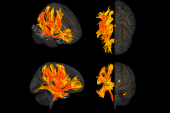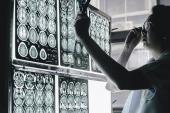AHA Statement Outlines Cardiac Contributions to Brain Health
The interconnection is far deeper than previously thought, raising new ways to promote health, says Fernando Testai.

Improving and promoting cardiovascular health isn’t just good for your heart but also is crucial to the maintenance of a healthy brain, according to a scientific statement from the American Heart Association. The paper arrives amid increasing recognition that some of the most common cardiac conditions are inextricably linked to cognitive issues via modifiable and nonmodifiable risk factors.
“Over the last decade or so, there's been new evidence showing that the interconnection between the brain and the heart is probably far deeper than what we initially thought,” writing group chair Fernando D. Testai, MD, PhD (University of Illinois at Chicago), told TCTMD. “It goes far beyond whether someone has a stroke or not.”
The statement, which was published online October 10, 2024, in Stroke, addresses what is known about the delicate balance between brain health and heart failure (HF), atrial fibrillation (AF), and coronary heart disease (CHD). It also reviews the pathogenic processes that link all three of those conditions to increased risk for cognitive impairment and dementia.
The writing group also sought to acknowledge new areas for potential intervention that might help patients and their physicians preserve brain health, said Testai. The current understanding of cardiac disease’s contributions to cognition “remains fraught with inconsistencies and gaps,” they write.
A Look at the Data: HF, AF, and CHD
Data suggest that more than 40% of patients with HF experience cognitive impairment, with those effects seen in areas such as attention, language and verbal fluency, processing speed, working memory, and executive function. How it happens isn’t entirely clear, Testai and colleagues note, although it may be related to shared underlying risk factors affecting the heart and brain, transient ischemic attack or stroke, or covert brain injury as a result of reduced blood flow.
In the CARDIA study, for example, diastolic dysfunction and abnormal cardiac structure at midlife were associated with cognitive decline, but reduced left ventricular ejection fraction was not. Other factors prominent in HF patients may also contribute to cognitive issues, including inflammation, neurohormonal activation, and genetic predisposition.
Testai and colleagues say a notable problem when examining HF data in the context of brain health is that most cognitive outcomes have been reported for HF as a global entity, with limited nuance as to differences by phenotype. It does appear that worsening cognition in heart failure with reduced ejection fraction (HFrEF) “has been primarily associated with a reduction of cerebral blood flow, with the association being stronger in older adults,” they note. Other studies have suggested that neurohormonal activation and hypoxic/ischemic injury may be contributors to cognitive decline in HFrEF patients.
In HF with preserved ejection fraction, cognitive decline appears to be associated with comorbid vascular risk factors. Other common comorbidities such as obesity and sleep-disordered breathing also are known to be associated with cognitive decline.
Aggressive management of risk factors is particularly important in those at risk for HF to prevent cognitive disease and maintain brain health, say Testai and colleagues. They also recommend screening for cognitive impairment in those undergoing surgical interventions for severe HF due to the frequency of stroke complications.
In patients with AF, the impact of the disease on cognition is not well understood. Data from a systematic review and meta-analysis shows that having AF may increase the risk of cognitive impairment significantly in patients even if they don’t have a stroke. Dementia risk also is elevated in AF patients even in the absence of stroke. Thus far, the data suggest that AF burden could be a factor in this relationship.
At least one large observational study has noted a lower long-term risk of dementia in AF patients who undergo catheter ablation rather than receiving antiarrhythmic drugs alone, but Testai and colleagues say those data should be interpreted with caution. Ongoing research, they add, is actively looking at whether restoration of regular sinus rhythm via catheter ablation might be more efficacious in reducing cognitive dysfunction and brain abnormalities than medications alone.
In CHD, cognitive impairment has been linked to vascular risk factors that trigger systemic inflammation as well as possibly neuroinflammation and blood-brain barrier dysfunction. Atherosclerosis can contribute to inflammation, leading to disruptions of the cerebral macro- and microcirculations.
Genetically, there may be shared risk between CHD and brain health in some individuals. In others, genetic factors coupled with race and ethnicity as well as external factors like traumatic injury and toxins have the potential to potentiate the development of atherosclerosis and influence cognitive outcomes, according to Testai and colleagues.
Microvascular dysfunction in patients with CHD also may open the door to cognitive impairment via cerebral small-vessel disease and reduced cerebral blood flow. Similarly, cardiac sequelae may affect the brain and its functioning via a variety of changes in hemodynamics.
Maintaining BP in range is important in patients with CHD to lower the risk of dementia and cognitive impairment, as are controlling diabetes, reviewing lifestyle habits, and addressing individualized risk factors related to health literacy, need for support and services, medication affordability, and others.
Goals and Perspectives
From a research perspective, Testai and colleagues note that an important barrier to clarifying the heart–brain connection is a lack of evidence that the management of cardiac diseases has a beneficial effect on age-related cognitive changes. While some evidence exists to suggest that statins and some antihypertensives may improve cognitive performance, the writing group says cardiovascular trials should incorporate standardized cognitive and functional outcomes and follow patients longer to get needed brain health data.
“I think that we all agree that we would like to get cognitive outcomes out of cardiac studies,” Testai told TCTMD. “Yet it's a challenge to do so . . . and from a practical standpoint it may be financially difficult.”
One work-around may be to begin looking at cognitive outcomes earlier by following younger adults rather than the older age groups typically seen in many CV trials, to assess the effect of vascular risk factors on the development of cognitive issues later in life.
Testai said it is also clear from the published literature that the data don’t yet fully capture the association between the heart and brain across the spectrum of races and ethnicities of patients due to historic underrepresentation in clinical trials, which is just now beginning to be addressed.
Aside from that, the scientific statement suggests that “culturally and age-tailored education campaigns promoting early adoption of healthy lifestyles may reduce the burden of dementia in the general population.”
The AHA recommends early adoption in particular of Life’s Essential 8, which has been linked to gains in disease-free life-years.
“By definition, cardiologists come into the game too late,” Testai said. “What we would like to see is that changes are implemented far earlier, before you get to see the cardiologist . . . and that means emphasizing a healthy life that begins in childhood. Primordial prevention [is important to] ensuring that you do everything you have to do to prevent developing diseases that will eventually lead you to heart disease and brain dysfunction as you age.”
L.A. McKeown is a Senior Medical Journalist for TCTMD, the Section Editor of CV Team Forum, and Senior Medical…
Read Full BioSources
Testai FD, Gorelick PB, Chuang P-Y, et al. Cardiac contributions to brain health: a scientific statement from the American Heart Association. Stroke. 2024; Epub ahead of print.
Disclosures
- Testai reports no relevant conflicts of interest.





Comments